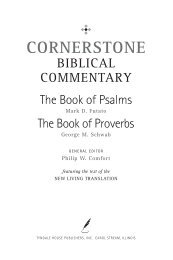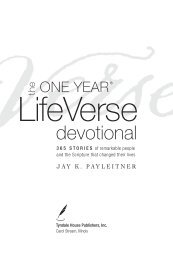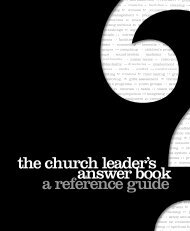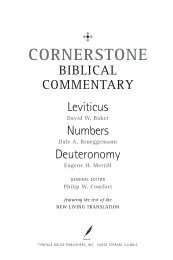Cornerstone Biblical Commentary: Luke and Acts - Tyndale House ...
Cornerstone Biblical Commentary: Luke and Acts - Tyndale House ...
Cornerstone Biblical Commentary: Luke and Acts - Tyndale House ...
Create successful ePaper yourself
Turn your PDF publications into a flip-book with our unique Google optimized e-Paper software.
LUKE 6<br />
Little is known about <strong>Luke</strong>’s personal life, though the Anti-Marcionite Prologue to<br />
<strong>Luke</strong> claims that he never married <strong>and</strong> died at the ripe old age of 84 in Boeotia<br />
(Greece; though some place his death in Bithynia [Turkey] or Ephesus), being “full<br />
of the Holy Spirit.” 8 There are a variety of traditions regarding his activities in his<br />
later years <strong>and</strong> the place <strong>and</strong> manner of his death. Some writers have connected him<br />
with Antioch in Syria (as does the Anti-Marcionite Prologue) <strong>and</strong> have noted the<br />
detailed references in <strong>Acts</strong> to that city (<strong>Acts</strong> 6:5; 11:19-27; 13:1; 14:26; 15:22-35).<br />
Others, drawing attention to the “we” passages of <strong>Acts</strong>, have suggested that <strong>Luke</strong><br />
had a special link with Philippi. They argue that <strong>Luke</strong> was the “man from Macedonia”<br />
who appeared in a vision to Paul at Troas, worked with Paul in evangelizing his<br />
native l<strong>and</strong>, remained in Philippi, <strong>and</strong> later resumed contact with Paul <strong>and</strong> the<br />
missionary team when they returned to Philippi (<strong>Acts</strong> 16:8-17; 20:5-6). Certainly,<br />
there are detailed references in <strong>Acts</strong> to both Antioch (<strong>Acts</strong> 6:5; 11:19-27; 13:1;<br />
14:26; 15:22-35) <strong>and</strong> Philippi (<strong>Acts</strong> 16:8-17; 20:5-6), but any conclusions drawn<br />
from these references remain speculative.<br />
Despite the limitations of our knowledge, much can be learned about the author’s<br />
interests <strong>and</strong> concerns from the study of <strong>Luke</strong>’s Gospel <strong>and</strong> the book of <strong>Acts</strong>,<br />
where many of the same themes frequently appear (e.g., concern for the poor, interest<br />
in the stories of women, the importance of prayer), each of which is discussed<br />
below.<br />
Before closing this section on authorship, it must be said that J. W. Wenham<br />
(1991) has proposed that the author of the third Gospel <strong>and</strong> <strong>Acts</strong> is Lucius, a<br />
prophet <strong>and</strong> teacher who came from Cyrene <strong>and</strong> served as a leader in the church at<br />
Antioch in Syria (<strong>Acts</strong> 13:1). A man by the same name is noted elsewhere in the<br />
New Testament as an associate of Paul (Rom 16:21). However, there is no clear evidence<br />
that either of these two people is the same as the reputed author of the Gospel<br />
of <strong>Luke</strong> <strong>and</strong> <strong>Acts</strong> (Achtemeier 1985:582), despite the creative attempt of Wenham<br />
to connect Lucius with the better-known <strong>Luke</strong>.<br />
DATE AND OCCASION OF WRITING<br />
<strong>Luke</strong>’s Gospel has been dated as early as AD 59–63 <strong>and</strong> as late as the latter part of the<br />
second century. The question of dating is a complex one <strong>and</strong> involves the book of<br />
<strong>Acts</strong> as an integral part of <strong>Luke</strong>–<strong>Acts</strong>. Paul’s ministry certainly dominates the second<br />
half of <strong>Acts</strong>, <strong>and</strong> the last quarter of the text is occupied with Paul’s trip to Rome as a<br />
prisoner awaiting trial. However, <strong>Acts</strong> ends without telling us the outcome of Paul’s<br />
trial, leading some to argue that it had not taken place by the time <strong>Acts</strong> was complete.<br />
In this view, <strong>Acts</strong>, <strong>and</strong> possibly <strong>Luke</strong>–<strong>Acts</strong>, is dated in the early 60s AD.<br />
Many scholars have opposed this view (cf. Fitzmyer 1981:54-56; Noll<strong>and</strong><br />
1989:xxxix; C. A. Evans 1990:2). They note that <strong>Luke</strong> himself called attention to the<br />
fact that other Gospel accounts had preceded his (1:1), <strong>and</strong> Mark’s Gospel was<br />
almost certainly one of his sources. Thus, acknowledging that <strong>Luke</strong> used Mark in<br />
the composition of his Gospel, most scholars opt for a date for <strong>Luke</strong>–<strong>Acts</strong> after the<br />
destruction of Jerusalem in AD 70, positing a date between AD 70 <strong>and</strong> 90.
















